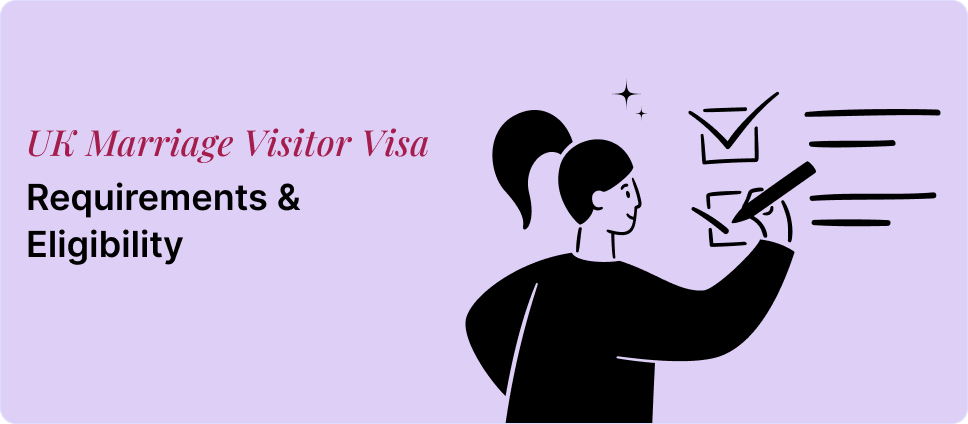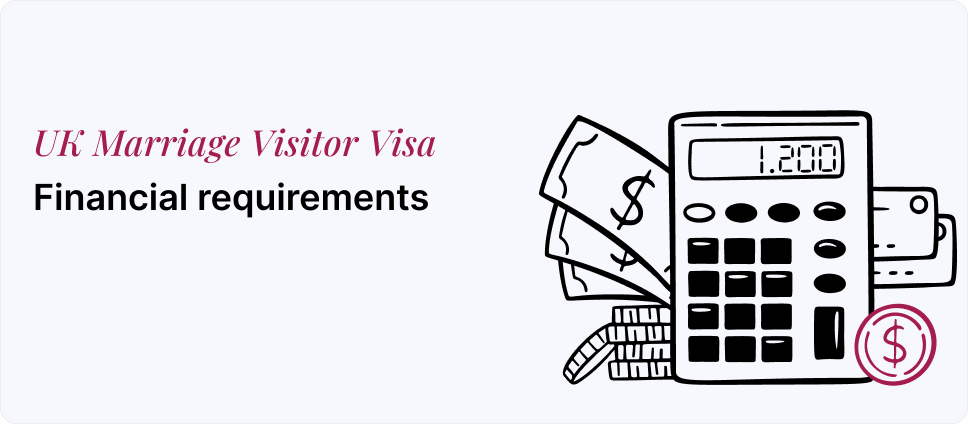Key Takeaways
To qualify for a UK Marriage or Civil Partnership Visitor Visa, applicants must be 18 or older, in a genuine relationship, and have plans to marry or enter a civil partnership within 6 months. Proof of genuine intention, financial stability, and plans to return home, including accommodation and travel funds, is required.
Holders can get married, give notice of marriage and pass through the UK in transit. You cannot claim public funds, extend their stay, switch visa types, work, or study.
The application involves completing an online form, paying a fee of £127, submitting supporting documents, booking an appointment at a Visa Application Centre for biometric data, and ensuring all information is accurate and complete. Processing time is generally up to 3 weeks, or sooner if you opt for Priority service at specific locations.
The Marriage Visitor Visa is for those who do not intend to settle in the UK after marriage. In contrast, the Fiancé(e) Visa or Proposed Civil Partner Visa allows for a subsequent application for a Spouse Visa or Civil Partner Visa to settle in the UK.
Services
Expert Assistance for UK Marriage Visitor Visa
UK Marriage Visitor Visa Consultation
Get personalised visa guidance tailored to your unique circumstances.
UK Marriage Visitor Visa Applications
Maximise the chance of a successful outcome with expert help to prepare and submitting your UK Marriage Visitor Visa application.
Appeal UK Marriage Visitor Visa Refusal
We assist with appeals and reviews to give your UK Marriage Visitor Visa application the best chance of success after a refusal.
Table of contents
What is the UK Marriage or Civil Partnership Visitor Visa?
The Marriage or Civil Partner Visit Visa is designed for couples who want to visit the UK to marry or enter into a civil partnership during their visit. This visa is ideal for those who do not intend to settle in the UK but only wish to register and celebrate their marriage or civil union in the United Kingdom.
Applicants need to prove that they are in a legitimate relationship and intend to leave the UK at the end of their visit. The Marriage/Civil Partnership Visitor Visa is strictly for temporary stays, and individuals on this visa are not allowed to frequently visit the UK in a manner that suggests they are trying to make it their primary residence.
Duration and Validity
The Marriage or Civil Partnership Visitor Visa is valid for a maximum of 6 months. It allows visitors to enter the UK to marry or enter into a civil partnership within this period. This timeframe dictates the window within which all marriage or civil partnership arrangements must occur.
Once the 6-month period concludes, the visa holders must leave the UK.
Family Members
You can bring your dependent family members with you (e.g., your partner and children). Still, they must apply for and be granted their respective Visitor Visa if required to do so and meet the relevant Visit category requirements.
Permitted Activities:
With a Marriage/Civil Partnership Visit visa, you can:
- Give notice of marriage or civil partnership at a UK Registry Office.
- Get married or enter into a civil partnership within 6 months of arrival.
- Pass through the UK in transit (on your way to another country).
- Engage in activities related to your work or business overseas, such as attending meetings, as long as these are not the primary purpose of your UK trip.
Restrictions:
With a Marriage or Civil Partnership Visitor visa, you cannot:
- Claim any form of public funds or benefits.
- Live in the UK for extended periods through frequent visits.
- Extend your visa.
- Switch to another type of visa.
- Get a job.
- Study.
Differences Between Marriage Visitor Visa and Fiancé Visa
The Fiancé(e) Visa allows for application within the UK for a Spouse Visa after marriage, enabling you to settle in the UK with your Settled Partner. In contrast, the Marriage Visitor Visa is for those not planning to remain in the UK long-term after their wedding or civil partnership registration.
Applicants should consider their long-term plans before deciding which visa to apply for. If you plan to live in the UK after your wedding, the Fiance(e) Visa or Proposed Civil Partner Visa is likely the better option.
Giving Notice to Marry in the UK
Giving notice to marry in the UK involves both partners attending a Register Office in person to declare their intention to marry or enter into a civil partnership. This process is known as ‘giving notice.’
Requirements and Process:
- In-Person Notice:
- In England and Wales, notice must be given in person at a local Register Office.
- Timing:
- Notice must be given at least 28 days before the wedding. However, the Home Office can extend this period in some instances.
- For example, if you give notice on June 1st, the earliest date you can get married or form a civil partnership is June 30th.
- Legal Statement:
- Both partners must sign a legal statement at the local Register Office declaring their intent to marry or form a civil partnership.
- Fees:
- Standard Fee: £42 per person for those who are not subject to immigration control.
- Immigration Control Fee: £57 per person if either party is subject to immigration control.
Documents to Give Notice:
You must bring originals of the following documents to your appointment:
- Details of the Final Venue for Your Ceremony
- Valid Passport (or UK birth certificate if you were born before 1 January 1983)
- Proof of your UK immigration status (if you are not a UK citizen)
- Proof of Your Home Address
- Proof of Any Name Changes (e.g. a copy of a deed poll)
- Proof of your previous marriage (e.g. final divorce certificate or death certificate)
- Any other document as required by the Register Office, such as translation of non-English documents, passport-sized photographs or more.
Eligibility and Requirements

To qualify for a UK Marriage or Civil Partnership Visitor Visa, applicants must meet specific eligibility criteria:
- Age: Applicants must be 18 years or older.
- Marital Status: You must demonstrate that you are legally free to marry or enter into a civil partnership and that any previous relationship has broken down.
- Genuine Relationship: You must be in a genuine relationship with a partner you will marry in the UK.
- Duration of Stay: Applicants must intend to visit the UK for at most 6 months and leave at the end of their stay. You must prove that you do not plan to live in the UK for extended periods through frequent or successive visits or make the UK your primary home.
Proof of Intent to Marry or Enter into a Civil Partnership
Applicants for a Marriage/Civil Partnership Visitor Visa must provide concrete proof that they intend to marry or register a civil partnership within the UK. This can include evidence such as wedding plans or venue bookings. For instance, confirming a venue booking or communicating with the venue can demonstrate genuine intention.
You must submit a valid passport and evidence of your UK marriage or civil partnership registration plans. A certified translation into English or Welsh is mandatory if any documents proving freedom to marry are in a foreign language.
The Home Office will conduct checks to assess marriage or civil partnership arrangements, the couple’s relationship, living arrangements and future plans. They will only grant the visa if they are satisfied with the evidence that the applicant is in a genuine relationship, not a sham marriage.
Financial Requirements

Applicants for the Marriage or Civil Partnership Visit Visa must demonstrate that they have sufficient funds to support themselves during their stay in the UK, including accommodation, travel and wedding expenses, as well as any other costs and daily expenses that may arise.
A credible third party can cover some or all the travel, living, and accommodation expenses if they have a genuine professional or personal relationship with the applicant, comply with immigration laws, and can support the applicant during your stay as a Visitor.
Applicants must also show they can cover travel expenses for their return or onward journey.
Previous Marriages
If you have been married or in a civil partnership, you must provide documents proving your freedom to remarry or enter into a new civil partnership, including original divorce or annulment documents. If these documents are not in English or Welsh, they must be accompanied by a certified translation.
Documentation Requirements

The plethora of supporting documents for a Marriage or Civil Partnership Visitor Visa will depend on your circumstances. For example, if applicable, you may need to provide additional documents such as divorce decrees or death certificates.
Required documents include:
- Valid Passport or Travel Document: Your Passport must be current, contain at least one blank page, and be valid for the entire duration of your stay in the UK. Previous passports may also be required to show any relevant travel history.
- Proof of Financial Viability: You must provide evidence that you can financially support yourself during your UK stay. If a sponsor provides financial support, include a letter confirming their support and their financial documents.
- Proof of Intention to Marry or Enter a Civil Partnership: Provide evidence such as booking confirmations from the registry office or wedding venue, letters or emails confirming the arrangements for the ceremony, and any receipts for deposits paid.
- Accommodation Details: Evidence of your accommodation arrangements in the UK, such as hotel bookings, rental agreements, or a letter from a host confirming your stay.
- Evidence of Ties to Home Country: Show your intention to return to your home country after your visit with return travel tickets, proof of employment, property deeds, family ties, and evidence of personal or professional commitments.
- Proof of Relationship: Provide evidence of your relationship with your fiancé(e) or proposed civil partner, such as joint responsibilities, correspondence, and references from reliable sources.
You must provide certified translations if documents are not in English or Welsh.
Processing Time
The general processing time for Marriage/Civil Partnership Visitor visa applications is up to 3 weeks. However, it can take longer if the Home Office needs to clarify any details about your relationship or other aspects of your application.
Application Fees
Marriage Visitor Visa applications cost £127. Depending on availability, specific locations may offer the option to accelerate the decision-making by adding Priority service for an extra £500.
How to Apply for the Marriage or Civil Partnership Visitor Visa
Applying for a UK Marriage or Civil Partnership Visit Visa involves submitting an online application through the UK government website while you are outside of the UK and before you travel. Follow these steps to apply:
1. Check Eligibility: Ensure you meet all eligibility requirements for the Marriage Visitor Visa.
2. Complete the Online Application Form: Complete the correct online application form available on the official UK government website. You can save your progress and complete the form later if needed. Be truthful and ensure all required information is accurate, including your immigration history, travel dates, accommodation details, estimated travel costs, and current circumstances, such as your home address and contact details.
3. Complete the Declaration: Complete a declaration confirming the accuracy and completeness of the information provided.
4. Pay the Application Fee: Pay the non-refundable application fee. To confirm the amount, check the current fee schedule on the official UKVI (UK Visas and Immigration) website.
5. Upload Supporting Documentation: Upload the required supporting documents. Ensure all documents are clear and legible and meet the Home Office formatting and legal requirements.
6. Book an Appointment at a Visa Application Centre (VAC): If applicable, register with the local TLS or VFS Global to book an appointment to submit biometric information. Biometric data, including fingerprints and a digital photograph, are required for criminal checks and identity verification.
7. Attend Your VAC Appointment: Attend the Visa Application Centre to provide biometric information, including fingerprints, digital photographs, and any other necessary verification.
Marriage or Civil Partnership Visitor Visa Refusal

Common Reasons for Refusal
- Insufficient Evidence: Failure to provide adequate documentation or data to satisfy the Home Office about your marriage or civil partnership plans, relationship history, UK financial or accommodation arrangements, current circumstances or future plans.
- Lack of Ties to Home Country: Having few or no family and economic ties to your country of residence, especially if you have several family members or strong connections in the UK, can be a risk factor for not returning home.
- Inaccurate Information: Missing crucial full details or providing false information may invite the Home Office to scrutinise your application for signs of deception. This may lead to severe consequences, including a re-entry ban from the UK.
Next Steps After Refusal
If your visa application is refused, you will receive an email explaining why and the next steps. You can either:
- Make a Fresh Application: This is often the fastest and most efficient way to proceed. There is no specific time limit or deadline for reapplying for a UK Marriage visa. However, ensure that all issues identified in the refusal are addressed. Getting professional support in building a stronger case with improved supporting documents will greatly enhance your prospects of success.
- Challenge the Decision: If you believe the decision was unlawful, unreasonable, or procedurally improper, you may consider applying for a Judicial Review. Challenging the decision on legal grounds is complex, so seeking expert advice is advisable to assess the chances of success.
Switching Visa Categories
Switching visa categories in the UK while on a Marriage/Civil Partnership Visitor Visa is not usually permissible. Visa holders cannot extend their stay by switching to another visa category, such as a Partner Visa, while in the UK. If you wish to settle in the UK through a Spouse Visa or Civil Partner Visa, you would have to apply from your country of residence.
If you wish to apply for a different visa after your Marriage/Civil Partnership Visit Visa expires, you must adhere to the latest procedural rules by returning to your home country and submitting the application there. This ensures the visa system is not misused and each visa category serves its specific purpose.
Get Support Applying for a UK Marriage Visa
The UK Marriage or Civil Partnership Visit Visa is an excellent option for those wishing to marry or temporarily register a civil partnership in the UK. Our team of expert Immigration Lawyers have decades of experience to support you through every stage of your Marriage or Civil Partner Visitor Visa application process. We have successfully helped thousands of individuals navigate the complex UK visa application process. Our tried-and-tested experience can help you avoid the stress and uncertainty often associated with applying for a UK visa, ensuring you submit the strongest application possible for a smoother and more cost-efficient experience.
We provide comprehensive guidance at each step of the process, including:
- Understanding Eligibility Criteria: Ensuring you meet all requirements to qualify for the visa and how to overcome any unique issues in your case.
- Completing the Application Process: Assisting with accurately completing and submitting your application according to your timeline.
- Meeting Financial, Relationship, Accommodation and Other Requirements: Helping you gather and present necessary financial, relationship, accommodation and other relevant evidence. If you face any documentation difficulties, we can draw upon our daily experience to advise you on various solutions.
- Providing Ongoing Support: Representing you in communicating with the Home Office and addressing any questions or concerns throughout the application process.
Navigating the UK immigration process requires careful preparation and great attention to detail. With our expertise, you can confidently manage each aspect of your application with our support every step of the way, from eligibility and financial requirements to understanding visa restrictions.
FAQ
How long does it take to get a decision on my Marriage Visitor Visa application?
Do we need a Marriage/Civil Partnership visit visa if our ceremony will not be recognized under UK law?
Can I switch to another visa category while in the UK on a Marriage Visitor Visa?
How much does a Marriage Visitor Visa cost?
What documents do I need to provide for the Marriage Visitor Visa application?
Can I work in the UK on a Marriage Visitor Visa?
Can I use my regular visit visa to get married in the UK?
Do I need a Marriage/Civil Partnership visit visa to convert my civil partnership to a marriage in the UK?
Author

Qiyin Chuah
Founder & Principal
Qiyin is a globally-recognised immigration law expert:
- Hong Kong iMoney Magazine interview on Business Immigration from High Net Worth Individuals (HNWI), 2016
- ITV News interview about the Tier 2 Work Visa quota and NHS staff shortages, 2018
- The LegalTech Book: The Legal Technology Handbook for Investors, Entrepreneurs and FinTech Visionaries on the subject of ‘Humanise with Lawtech Lawyering’ (publisher: Wiley, 2020)
- Goldman Sachs 10,000 Small Businesses UK National cohort alumni, 2021
Qiyin is an industry expert with more than 15 years of legal experience. She graduated from the University of Manchester with an LL.B (Hons) in Law and an LLM in International Business Law. Initially trained in Corporate Law, she was inspired to pursue Immigration Law following a personal Visa experience. In 2011, Qiyin founded QC Immigration from frustration of the quality of client service in the market, plus the desire to build a healthier company culture. As a highly-skilled migrant herself, Qiyin fully understands the complicated circumstances and high expectations of our clients. She has proven victories in defending our clients’ businesses, children’s best interests, women’s rights, LGBT rights and challenging Home Office refusals. Our returning clients typically stay with us for over 6 years from obtaining their very first visa until British citizenship. Qiyin regularly provides mentoring, training and supervision to other lawyers in their pursuit for similar successes.